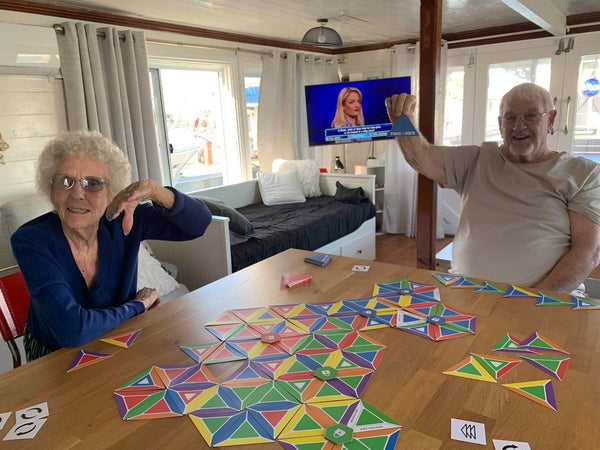
Tabletop Games and Brain Power: The Cognitive Benefits
There’s something about sitting around a table for a game that just feels right. You shuffle the cards or spread out the pieces, maybe pour a cuppa or grab a biscuit, and before you know it—you’re halfway into a game, the conversation is flowing, and everyone’s a bit more present than they were five minutes ago.
Funny thing is, while you’re trying to win, or maybe just not come last, something else is going on in the background. Your brain? It’s wide awake. Not in a stressed or overloaded way—but in that comfortable, alert way that happens when you’re just enjoying yourself.
You’re not doing maths. You’re not solving puzzles on a timer. But your brain’s quietly working hard. And that’s kind of the magic of games like these.
Quick Summary
Playing games gets your brain moving without feeling like work.
You naturally plan ahead, adapt, and stay focused while having fun.
Memory and quick thinking improve just by staying in the flow of the game.
Shared games build quiet connection and confidence at any age.
No pressure, no screens—just a good time that happens to be good for you.
In this blog ...
1. It's All in the Timing
There’s this quiet rhythm that happens in games. You watch, you wait, you think about your next move. Sometimes you’re planning ahead without even realising it. Maybe you’re keeping a card for later or eyeing the space you’ll need in two turns. It’s not serious or complicated, but you’re definitely paying attention.
You’re thinking, “If I do this now… what happens next?” And just like that, your mind’s in motion. Not in a forced way—just naturally, like stretching your legs on a walk.
2. The Sneaky Memory Boost
Some games ask you to remember what’s been played. Others have rules that stick in your head after one or two rounds. Before you know it, you’ve remembered a full set of steps without writing anything down.
That kind of memory-building doesn’t come from repetition or drills—it comes from being in the moment. You’re not trying to remember—you just do.
And the best part? No pressure. No one’s testing you. It’s just part of the fun.
3. Every Game Feels a Bit Different
Even if you’ve played the same game a dozen times, it’s never exactly the same twice. Different people, different moves, different outcomes. You learn to go with the flow. Maybe something catches you off guard and you need to change direction. You adjust, you pivot, you try something new.
That kind of flexibility isn’t something we practise much once we’re out of school or work. But in games? It comes naturally.
4. A Bit of Quiet Focus
There’s something lovely about the kind of focus games bring. You’re alert, but relaxed. Engaged, but not overwhelmed. You’re tuned into what’s happening, but you’re not staring at a screen or checking your phone every two minutes.
It’s a kind of mental stillness that’s getting harder to find these days—and it’s surprisingly refreshing.
5. You’re Thinking in Pictures
Some games get you thinking in shapes or patterns. You’re not drawing diagrams or measuring anything, but your brain’s doing that quietly in the background—lining things up, seeing how they fit, visualising what goes where.
It’s the kind of visual thinking that helps with everything from rearranging the fridge to remembering where you put your keys. And it turns out, a few rounds of the right kind of game can give that part of your brain a gentle nudge.
6. It’s Not Just a Game - It’s a Conversation
The best games are the ones that get people talking. Maybe it’s friendly teasing, maybe it’s working as a team, or maybe it’s just the kind of back-and-forth that happens when you’re figuring something out together.
You learn a lot about people in those moments—how they think, how they handle surprises, what makes them laugh. Even when you're not saying much, you’re still reading the room. There's a whole layer of quiet connection that builds with every round.
7. A Confidence Builder in Disguise
There’s something satisfying about realising you’ve made a clever move—or learning a game and feeling good about how you played. It’s not about being the best. It’s about that little buzz you get when things click.
You feel like, “Yeah, I’ve still got it.” And you do. Whether you’re nine or ninety, that sense of achievement sticks.
8. No One's Calling It Learning - But It Is
No one plays a game thinking, “I’m going to improve my cognitive function today.” But ask anyone who plays regularly and they’ll tell you—they feel sharper, more engaged, and even a little lighter after a good game.
It’s not about chasing productivity. It’s about having fun, spending time with others, and keeping your mind moving in a way that feels completely natural. Some games are even officially recognised for how well they support learning and thinking—but honestly, that’s just a bonus.
Because at the end of the day, it’s not about brain science. It’s about enjoying yourself. The rest takes care of itself.
The Wrap Up
If you’ve ever walked away from a game night thinking, “That was exactly what I needed,” you’re not alone. There’s something quietly powerful about games that get us thinking, laughing, and connecting.
They don’t feel like exercise, but they keep the mind moving. They don’t feel like lessons, but we walk away a little sharper. And they don’t feel like therapy, but we almost always feel better afterward.
So the next time you reach for a deck of cards or unfold a game board, remember—you’re not just playing. You’re giving your brain exactly what it needs. And you’re probably making a few good memories while you’re at it.

Written by Erica
Game designer. Trigahex creator. Strategy enthusiast.
Got thoughts, feedback, or your own gameplay strategy? Send me a message - I'd love to hear your strategy.



